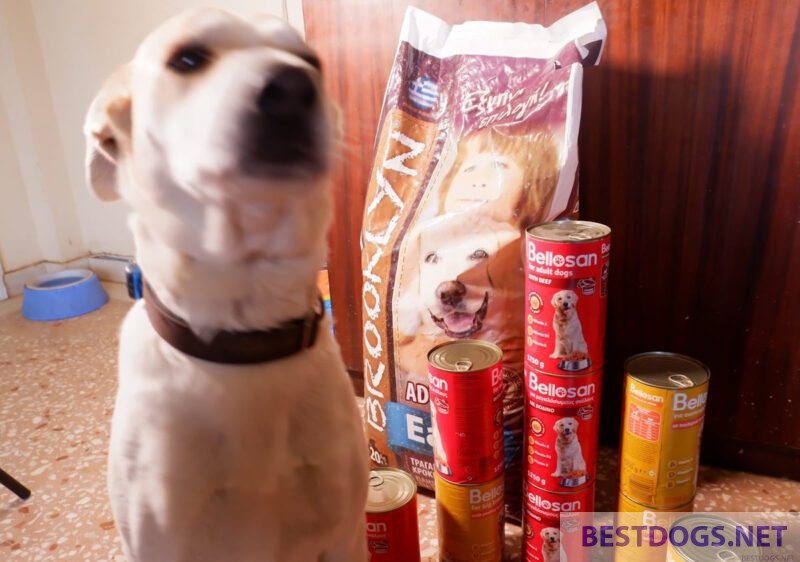Dog vomits liquid: Common causes and when to seek help.
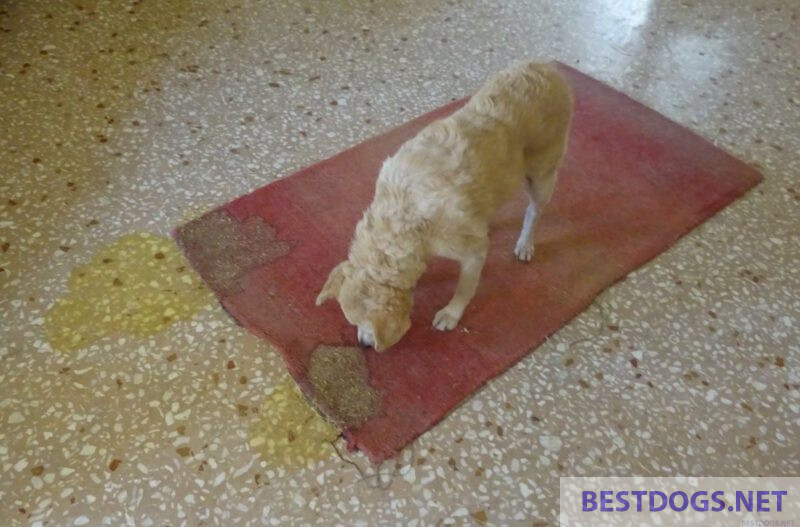
Dog vomits liquid: Common causes and when to seek help
Table of Contents
Dogs sometimes vomit clear liquid, which can worry their owners. This symptom often occurs when a dog’s stomach is empty. A dog throwing up clear liquid is usually vomiting saliva or water, and it may not always be a cause for alarm.
There are several reasons why a dog might vomit clear liquid. It could be due to an empty stomach, especially in the early morning or late at night. Other causes include acid reflux, drinking too much water, or eating something that upset their stomach.
While occasional vomiting might not be serious, it’s important to keep an eye on your dog’s behaviour. If the vomiting persists or is accompanied by other symptoms like lethargy or loss of appetite, it’s best to consult a veterinarian. They can determine if there’s an underlying issue that needs treatment.
Understanding Dog Vomiting
Dogs sometimes vomit for various reasons. Knowing the causes and types of vomit can help you decide when to seek veterinary care.
Common Causes of Vomiting in Dogs
Dogs may vomit due to eating too fast or consuming something they shouldn’t. Dietary indiscretion is a common cause. This includes eating spoiled food, grass, or non-food items.
Toxins can also trigger vomiting. These may come from plants, chemicals, or human foods toxic to dogs. Parasites and bacterial infections in the gut often lead to vomiting as well.
Some dogs vomit when their stomach is empty. This can happen if they haven’t eaten for a while. A foreign object stuck in the digestive tract is another possible cause.
Medical conditions like kidney disease, liver problems, or pancreatitis can cause vomiting too.
Types of Vomit and What They Indicate
The colour and consistency of vomit can offer clues about its cause. Clear liquid vomit often means the dog is bringing up saliva or water. This may happen if the stomach is empty.
Yellow vomit might be bile. Dogs sometimes vomit bile if they haven’t eaten for a while. White, foamy vomit could mean the stomach is too acidic.
Food-like vomit suggests the dog ate something that disagreed with them. If you see blood in the vomit, it’s time to ring the vet right away.
Green vomit might mean the dog ate grass. Brown vomit could indicate the dog ate poo.
Recognising Acute vs. Chronic Vomiting
Acute vomiting happens suddenly and doesn’t last long. It might be due to eating something bad or a brief illness. If a dog vomits once or twice but seems fine otherwise, it may not be serious.
Chronic vomiting lasts longer than a week or happens often. It can be a sign of a more serious problem. Chronic vomiting can lead to weight loss and poor health.
If vomiting happens more than once a day or lasts more than 24 hours, call the vet. Also seek help if you see other symptoms like lethargy, loss of appetite, or diarrhoea.
Keep track of how often your dog vomits and what the vomit looks like. This info can help your vet figure out what’s wrong.
Clinical Signs and Symptoms

Dogs vomiting liquid can show various signs. These range from physical changes to behavioural shifts. Quick action is key when symptoms worsen.
Physical and Behavioural Indicators
Vomiting clear liquid in dogs often involves bringing up saliva or water. This may be accompanied by retching or gagging sounds.
Some dogs might vomit yellow or green bile, especially on an empty stomach. Foamy vomit can indicate excess gas or acid in the stomach.
Look for signs of dehydration, such as:
- Dry gums
- Sunken eyes
- Loss of skin elasticity
Dogs may show a loss of appetite and refuse food or water. Lethargy and weakness are common, with the dog seeming less active than usual.
Assessing Severity: When to Worry
Mild cases may resolve on their own, but certain signs warrant immediate veterinary attention.
Frequent vomiting or inability to keep water down is concerning. This can quickly lead to severe dehydration.
Blood in vomit, whether fresh red or dark like coffee grounds, is always serious. Seek help straight away if you notice this.
Other red flags include:
- Fever
- Severe abdominal pain
- Persistent diarrhoea
- Collapse or extreme weakness
If vomiting continues for more than 24 hours or is accompanied by these symptoms, contact your vet promptly.
Diagnostic Approach
Proper diagnosis of a dog vomiting liquid requires a thorough examination and several tests. A vet will use a combination of medical history and diagnostic procedures to pinpoint the cause.
Importance of Medical History
A dog’s medical history is crucial for diagnosing vomiting issues. The vet will ask about the frequency and duration of vomiting, as well as any changes in diet or routine. They’ll want to know about the colour of the vomit, which can provide clues about the underlying problem.
Recent travel, exposure to other animals, or ingestion of foreign objects are important details. The vet will also inquire about other symptoms like diarrhoea, lethargy, or loss of appetite.
A thorough medical history helps the vet narrow down potential causes and decide which tests to run.
Common Diagnostic Tests
Vets use various tests to diagnose the cause of liquid vomiting in dogs. Blood tests can reveal infections, organ function issues, or metabolic imbalances. Urine tests may indicate kidney problems or diabetes.
X-rays can show blockages or abnormalities in the digestive tract. In some cases, an endoscopy might be necessary to examine the stomach and intestines directly.
Faecal tests can detect parasites or bacterial infections. If a specific disease is suspected, more targeted tests may be run.
These tests help the vet make an accurate diagnosis and develop an effective treatment plan, which may include medication or intravenous fluids.
Treatment and Management
When a dog vomits liquid, proper care is crucial. Quick action and the right treatments can help your pet feel better fast. Here’s what to do.
Immediate Care and Home Remedies
Start by taking away food and water for a few hours. This lets your dog’s tummy settle. After that, offer small sips of water. If the dog keeps it down, give more water bit by bit.
For mild cases, try a bland diet. Mix cooked white rice with boiled chicken. Feed small amounts every few hours. This easy-to-digest food can help soothe the stomach.
If your dog seems thirsty, try ice cubes. They help prevent gulping too much water at once. You can also use special pet electrolyte drinks to replace lost fluids.
Professional Veterinary Treatments
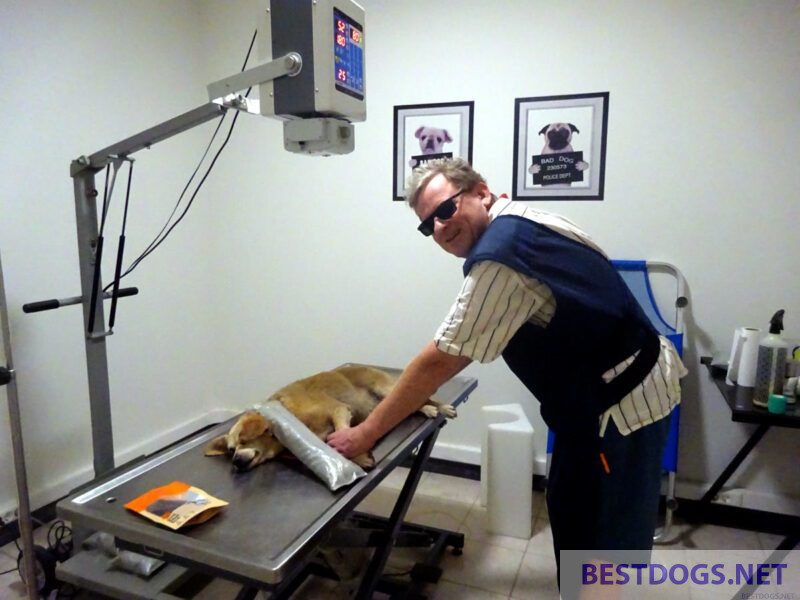
For serious or ongoing vomiting, see a vet right away. They might run tests to find the cause. Blood work, x-rays, or ultrasounds can help spot issues like pancreatitis.
Vets often give fluids to treat dehydration. They may use anti-nausea medications to stop vomiting. For tummy infections, antibiotics might help.
In rare cases, surgery could be needed. This might happen if the dog ate something it shouldn’t have. The vet will explain all options and help you choose the best one.
Post-Treatment Care and Prevention
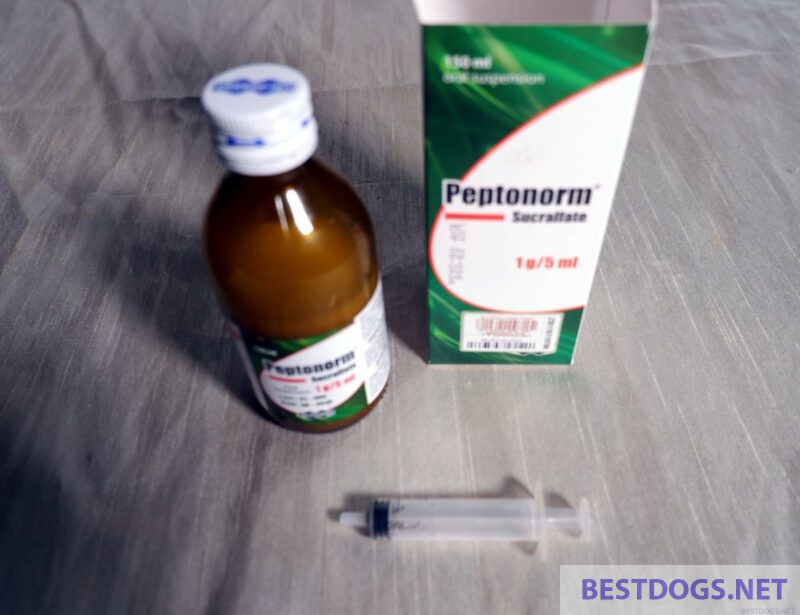
After treatment, follow the vet’s advice closely. Keep giving any prescribed meds as directed. Stick to the recommended diet plan, often a bland diet at first.
Let your dog rest. Avoid exercise until they’re fully better. Slowly return to normal food over a few days. Watch for any signs the problem is coming back.
To prevent future issues, feed a healthy diet. Avoid sudden diet changes. Keep bins closed so dogs can’t eat rubbish. Regular check-ups help catch health problems early.
Specific Conditions and Considerations
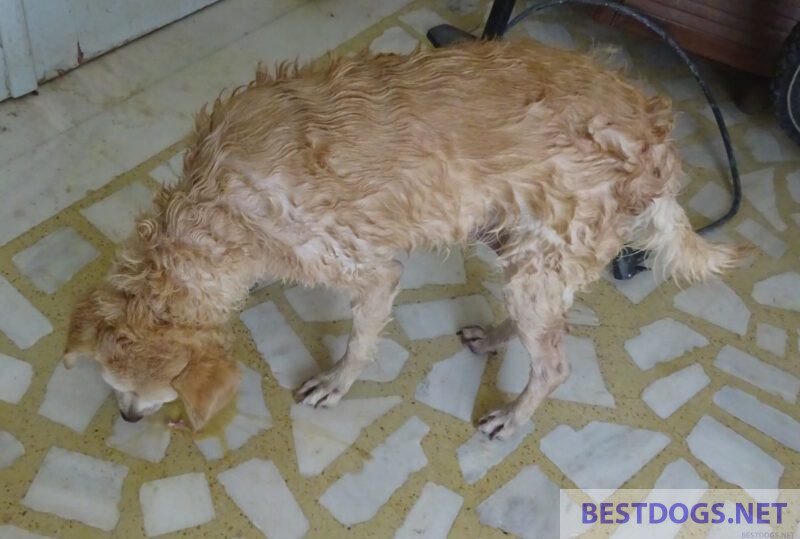
Dogs vomit liquid for many reasons. Some stem from what they eat, while others relate to health issues or consuming harmful items. Let’s explore the main causes.
Food-Related Issues
Food allergies can make dogs sick. If a dog eats something it’s allergic to, it might throw up clear liquid. This can happen right after eating or hours later.
Indigestion is another common problem. Dogs that eat too fast or too much may vomit. Treats can also cause upset tummies if given in large amounts.
Some dogs get bilious vomiting syndrome. They throw up yellow bile, often in the morning or when their stomach is empty. Feeding smaller, more frequent meals can help.
Gastrointestinal and Systemic Diseases
Many illnesses can make dogs vomit liquid. Gastritis, or stomach inflammation, is a frequent cause. It can be acute or chronic.
Liver disease and liver failure are serious conditions that may lead to vomiting. Cancer can also cause a dog to throw up, especially if it affects the digestive system.
Parasites like worms can irritate a dog’s gut and cause vomiting. Infectious diseases, such as parvovirus, are another possible cause. These need quick vet care.
Non-Food Related Ingestions
Dogs sometimes eat things they shouldn’t. Toxic substances can make them very ill. Common toxins include certain plants, chemicals, and human medicines.
Foreign bodies, like toys or bones, can get stuck in a dog’s gut. This can cause an obstruction, leading to vomiting. Surgery may be needed to remove the item.
Bloat is a dangerous condition where a dog’s stomach fills with gas and twists. It causes vomiting and needs emergency treatment. Large, deep-chested breeds are most at risk.
Nutritional Considerations
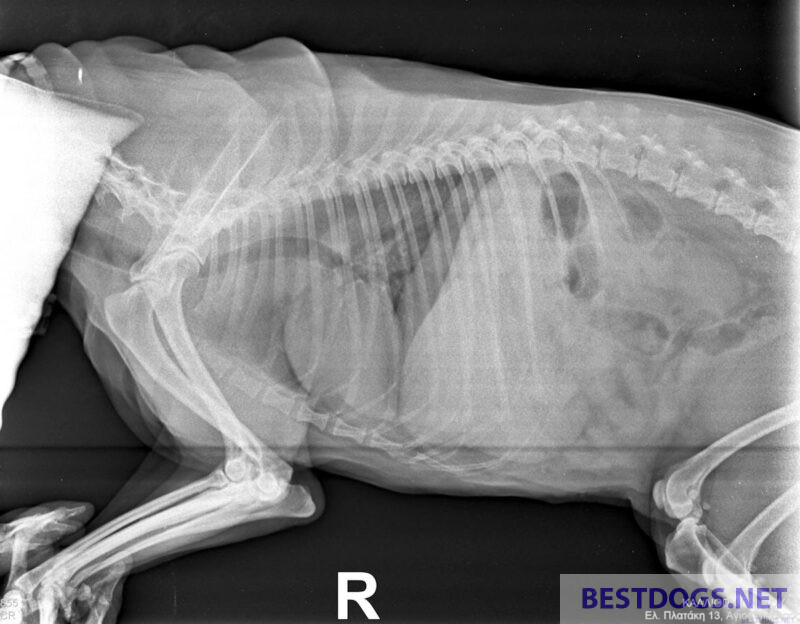
A dog’s diet plays a crucial role in preventing and managing vomiting. Proper nutrition can help ease digestive issues and reduce the risk of clear liquid vomit.
Customising a Diet for Your Dog
A healthy diet for dogs should include high-quality protein sources, complex carbohydrates, and essential fats. Feeding a bland diet can help dogs with sensitive stomachs.
Some options include:
- Boiled chicken and white rice
- Lean ground beef and pumpkin
- Cooked fish and sweet potato
It’s important to introduce new foods slowly. Start with small portions and gradually increase the amount over several days. This helps prevent digestive upset.
For dogs prone to vomiting, feeding smaller meals more frequently throughout the day can be beneficial. This approach can help reduce the strain on the digestive system.
Food Substances to Avoid
Certain foods can be dangerous for dogs and may cause vomiting or other health issues. Common items to avoid include:
- Chocolate
- Grapes and raisins
- Onions and garlic
- Xylitol (artificial sweetener)
- Fatty foods
Rich or fatty foods can trigger pancreatitis in dogs, leading to severe vomiting. It’s best to stick to a consistent, balanced diet and avoid table scraps.
Human treats and human food should be given sparingly, if at all. Many common ingredients in human foods can upset a dog’s stomach and cause clear liquid vomit.
Preventive Measures
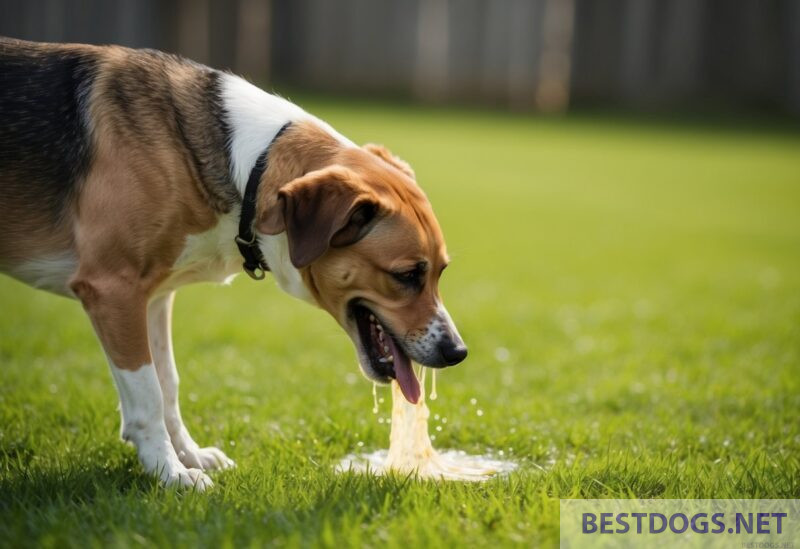
Taking steps to prevent dogs from vomiting liquid can help keep them healthy. These measures focus on lifestyle changes and regular vet visits.
Lifestyle Modifications
Reducing stress in dogs is crucial. Create a calm environment at home. Use soothing music or pheromone diffusers to ease anxiety.
Feed dogs smaller, more frequent meals. This can help prevent an empty stomach, which may cause vomiting.
For dogs prone to motion sickness, limit car rides. When travel is necessary, use special harnesses or crates to reduce movement.
Exercise is important, but avoid vigorous activity right after meals. A gentle walk can aid digestion.
Maintain a consistent feeding schedule. Stick to a high-quality diet recommended by your vet.
Regular Veterinary Check-Ups
Routine vet visits are essential for catching issues early. Schedule check-ups at least once a year for adult dogs.
During these visits, vets can perform health screenings. They may check for parasites or underlying conditions that could cause vomiting.
Keep your dog’s vaccinations up to date. This helps prevent illnesses that might lead to vomiting.
Discuss any changes in your dog’s behaviour or eating habits with the vet. They can offer tailored advice to prevent vomiting.
Ask about preventive treatments for common issues like worms. These can help avoid digestive problems.
Frequently Asked Questions
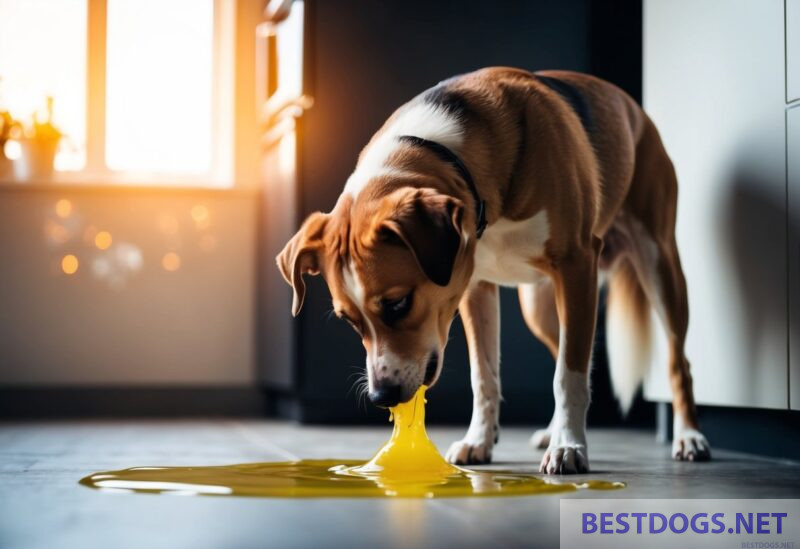
Dog vomiting clear liquid can be concerning for pet owners. Here are some common questions and answers to help understand this issue better.
Why does my dog keep vomiting clear fluid?
Dogs may vomit clear fluid due to an empty stomach or excess stomach acid. This often happens when a dog hasn’t eaten for a while or is feeling nauseous. Sometimes, it can be a sign of gastritis or other digestive issues.
Is it a cause for concern when a dog vomits clear liquid repeatedly?
Repeated vomiting of clear liquid can be a sign of an underlying health problem. If it happens multiple times in a short period, it’s best to consult a vet. Persistent vomiting can lead to dehydration and other complications.
What should I do if my dog is throwing up a watery substance?
If your dog vomits clear liquid once, withhold food for a few hours and offer small amounts of water. If vomiting continues or other symptoms appear, contact your vet. Always seek veterinary advice when you first notice signs of illness in your pet.
How can clear liquid vomit in dogs be an indication of underlying health issues?
Clear liquid vomit can sometimes indicate more serious conditions like kidney disease, pancreatitis, or even certain cancers. If accompanied by other symptoms like lethargy, loss of appetite, or irregular bowel movements, it’s crucial to seek veterinary care promptly.
What home remedies are safe for a dog regurgitating transparent liquid?
Safe home remedies include withholding food for 12-24 hours and offering small amounts of water. Once vomiting stops, introduce bland foods like boiled chicken and rice in small portions. However, these remedies should only be used for mild cases and with veterinary guidance.
When should I consult a vet about my dog vomiting a bile-like substance?
Consult a vet if your dog vomits bile-like substance frequently, especially if it’s accompanied by other symptoms. If vomiting persists for more than 24 hours, contains blood, or your dog shows signs of distress, seek immediate veterinary care.



